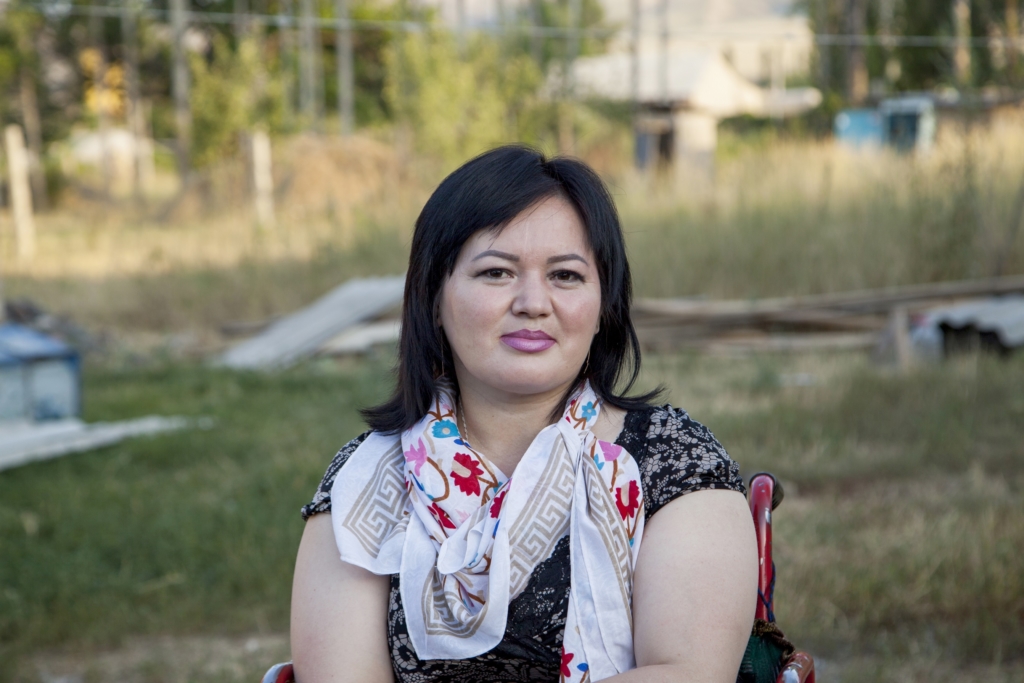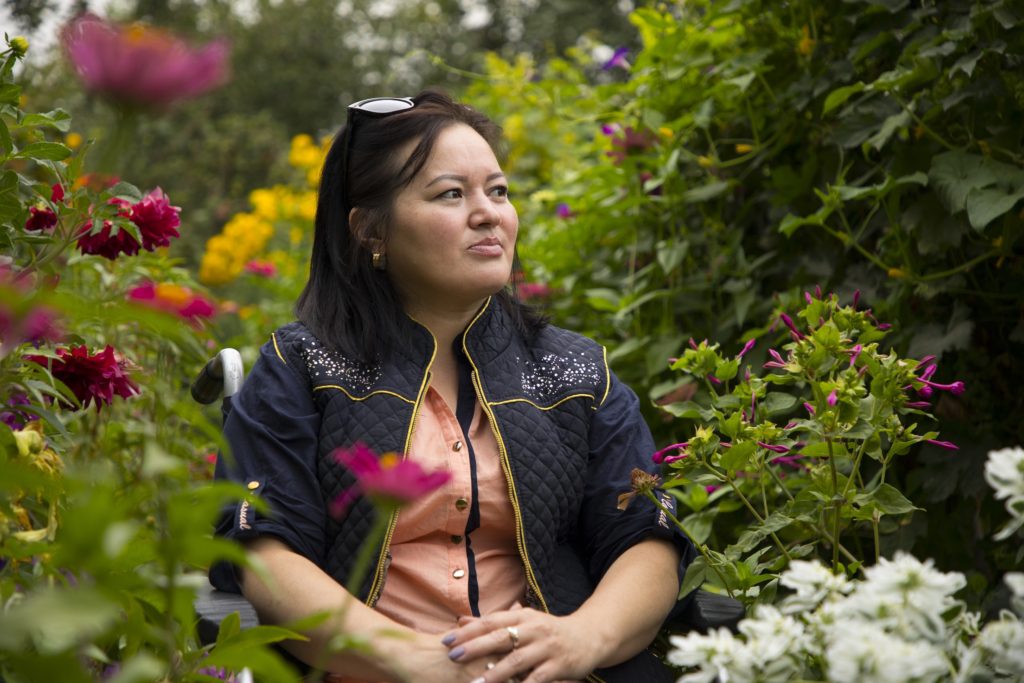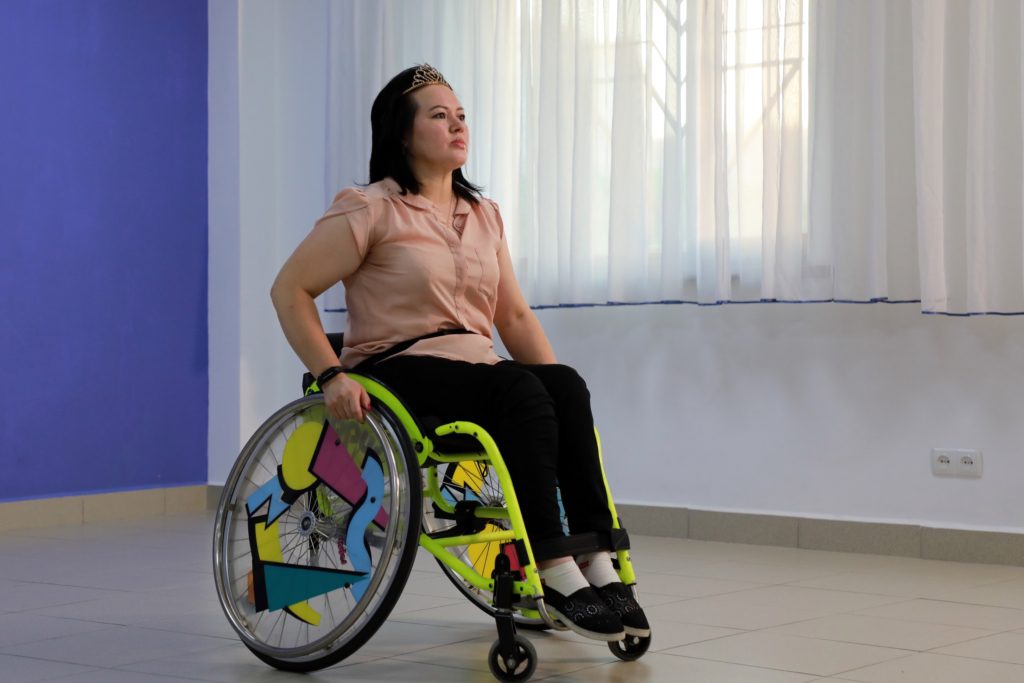Gulzar Duishenova is one of the nine women human rights defenders featured in Amnesty’s 2018 Write for Rights campaign. She shared her story with Amnesty International. Every possible effort was made to translate the story into English representing Gulzar’s style of speaking faithfully and precisely.
Gulzar Duishenova, mother of two, lost mobility after a car accident involving drunk drivers in 2002. In 2006, when she met people with similar problems in capital city of Bishkek, she became an active and very vocal member of civil society in Kyrgyzstan campaigning for equal access to health services, employment, infrastructure for women with disabilities. She is very brave in speaking out on issues that are not comfortable for many, including her family; such as right to health and independence for women with disabilities, right to accessible hygiene products. Women with disabilities are the most vulnerable people due to experiencing, on a minimum level, double discrimination: first, because of their gender, second – because of their real or perceived disability.
Every activist, like any other person, has her or his story. Some have been actively defending human rights since they were young. In other cases, human rights work found the defenders. My story is both extraordinary and very ordinary at the same time.
This year I have been featured, along with other eight women human rights defenders, in Amnesty International’s 2018 Write for Rights campaign. I have just returned home from the Human Rights Defenders World Summit in Paris. I give speeches and interviews, organise events for activists and work as a freelance translator. In the evenings I take dance classes for people with disabilities.
15 years ago my life was very different. My husband and I, together with our two children, lived in the mountains, where we looked after the family cattle. He operated a tractor and worked as a shepherd. I was a milkmaid.
A huge gap separates my life then and now. How did it happen that everything changed so drastically in my life? I’ll tell you about it now.

Gulzar Duishenova portrait in mother’s garden, where she was born. Bishkek, Kyrgyzstan.
Write for Rights cases 2018. Gulzar Duishenova is a fighter. In 2002, she lost movement in her legs after a car accident. But she never let it defeat her. She made it her life’s mission to ensure people with disabilities can live with dignity and move around freely. But she faces daily discrimination in a society where women aren’t meant to speak out and people with disabilities are seen as “invalids”.
My married life
I had a very ordinary youth. I went to school; danced at discos; and studied for my entrance university exams. Unfortunately, I didn’t get in to university, even though I really wanted to study. Instead, shortly after graduating from high school I was kidnapped by my future husband[1] and got married.
The tradition of bride kidnapping is still very much alive in Kyrgyzstan. If a woman has walked over the threshold of her kidnapper’s home, even if she has been forced to do so, she has to stay and marry him. Otherwise, she will be dishonoured. Women often have no choice or possibility to decide for themselves. Many things are considered shameful.
But in my case, everything was different. My mother-in-law and my father were both adopted by a distant relative. They grew up together and loved each other as brother and sister. That’s why they decided to marry off their children. They organised a bride viewing, and that was when I first met my future husband, Kenjebek. We immediately liked each other. Even more so — we fell in love. At first sight. After the viewing, my dad asked me whether I had liked my prospective fiancé. My dad loved me very much and would not do anything against my will.
After the wedding, my husband and I lived happily, and I gave birth to two sons. In the early days of our marriage, Kenjebek served in the army. When he left military service, we moved to a tiny village in the mountains where our family cattle grazed. There we looked after our cows and horses and brought up our sons. My parents’ village was not far so I frequently visited them.

Gulzar Duishenova often has to pay for expensive taxis to get around because there are no accessible options on public transport.
Write for Rights cases 2018. Gulzar Duishenova is a fighter. In 2002, she lost movement in her legs after a car accident. But she never let it defeat her. She made it her life’s mission to ensure people with disabilities can live with dignity and move around freely. But she faces daily discrimination in a society where women aren’t meant to speak out and people with disabilities are seen as “invalids”.
The morning that changed my life
One day I had to see my Mum urgently, so I left the house early in the morning. I will never forget this morning. As usual, I woke up at dawn to milk the cows. Then, I made breakfast for my husband and when he left, I got ready to go, too. As we didn’t have a car, I hitchhiked.
On the road I was picked up by a neighbour from my parents’ village who was returning home after a night of partying. He was driving an empty minibus and there were no proper seats or safety belts on the bus, just benches along the walls. But this was considered normal, so I hopped in without hesitation.
The bus took off and went at high speed, but at the turn of the road it suddenly turned over. I flew out the window and into the air and fell on the ground. The whole bus landed on me. I lost consciousness.
When I came back, I saw that several men were pulling me from under the bus. I was very confused and couldn’t think straight. The only thing I remember is not feeling anything at all. Then I was taken to a hospital. When I regained conscience once again, I saw that my neighbour, the minibus driver, was holding my shoulders so that I did not fall on the floor. He was trying hard not to fall asleep and when I looked at him closely I realised that he was very drunk.
I wanted to be taken to the capital, Bishkek, because it had better equipped hospitals. But instead we went to our administrative district centre, Kant. The reason being that the men who took me to the hospital were afraid that in Bishkek my neighbour would be arrested for drink-driving.
Kant hospital did not have the necessary equipment to perform my surgery, and after another twelve hours of waiting, I was finally transferred to Bishkek. I eventually had my surgery at midnight but by that time many precious hours had been wasted.
After the surgery, I learnt that I would never be able to walk again. And started using a wheelchair.
Gulzar Duishenova, mother of two, lost mobility after a car accident involving drunk drivers in 2002. In 2006, when she met people with similar problems in capital city of Bishkek, she became an active and very vocal member of civil society in Kyrgyzstan campaigning for equal access to health services, employment, infrastructure for women with disabilities. She is very brave in speaking out on issues that are not comfortable for many, including her family; such as right to health and independence for women with disabilities, right to accessible hygiene products. Women with disabilities are the most vulnerable people due to experiencing, on a minimum level, double discrimination: first, because of their gender, second – because of their real or perceived disability.
Thunderstorm at the pasture
I couldn’t recover for a very long time. My parents and Kenjebek took turns looking after me. Kenjebek tried comforting me as much as he could and was kind and patient when I got cranky. Every time he entered our home, he looked at me and smiled. Both my sons helped to take care of me as well.
When he wasn’t with me, Kenjebek looked after the cattle with other shepherds. One evening, one of the shepherds got drunk, and my husband had to go to the pasture in his place. The storm was coming and Kenjebek did not want to go. The night before we had talked to each other for hours as if we were saying goodbye. The last thing my husband said to our son right before he left was ”Look after Mum”.
The next morning, he did not come back. I refused to believe that something bad had happened to him and kept waiting. My family received the terrible news first, but they were scared to share it with me. Finally, I learnt it, too.
That night at the pasture, my husband was killed by a lightning strike.

Gulzar Duishenova, mother of two, lost mobility after a car accident involving drunk drivers in 2002. In 2006, when she met people with similar problems in capital city of Bishkek, she became an active and very vocal member of civil society in Kyrgyzstan campaigning for equal access to health services, employment, infrastructure for women with disabilities. She is very brave in speaking out on issues that are not comfortable for many, including her family; such as right to health and independence for women with disabilities, right to accessible hygiene products. Women with disabilities are the most vulnerable people due to experiencing, on a minimum level, double discrimination: first, because of their gender, second – because of their real or perceived disability.
“How did they manage to build all these houses?”
For four years, I did nothing but sit in my wheelchair and stare at trees and mountains. I wanted nothing, and I dreamed of nothing.
Finally, in 2007, my family asked whether I wanted to spend some time in a local rehabilitation centre. I didn’t care about any of it but agreed to go.
I thought that all people with disabilities at the centre would be like me: deeply unhappy and keeping to themselves. But the reality turned out to be quite different. At the centre, I met many happy people who dedicated all their time and energy to helping others.
It suddenly occurred to me how much I had been given in life: I had my true love, I gave birth to two wonderful sons, and I graduated from school. My early years had been filled with interesting events and people. And so, I really wanted to become useful – to help those who had never had any of it.
I also met outstanding activists, such as Ukey Muratalieva, Ainura Teleusheva and Gulmira Kazakunova who inspired me to get involved in the human rights work. The head of the centre for women with disabilities, Asipa Musaeva, immediately invited me to collaborate with them.
When several weeks later I returned home, I went to the window by which I had been sitting all those long four years and noticed new houses in the mountains. I asked my mother, ”How did they manage to build all those houses? I was away for only a couple of weeks!“ ”They were built a couple of years ago”, my Mum answered.

Gulzar Duishenova attends a dance class for people with disabilities. Bishkek, Kyrgyzstan.
Write for Rights cases 2018. Gulzar Duishenova is a fighter. In 2002, she lost movement in her legs after a car accident. But she never let it defeat her. She made it her life’s mission to ensure people with disabilities can live with dignity and move around freely. But she faces daily discrimination in a society where women aren’t meant to speak out and people with disabilities are seen as “invalids”.
Dreams for everyone
So I dove into human rights work. I started attending various events and meeting new people and getting involved in the projects of the Japan International Cooperation Agency (JICA). Later I started to speak about disability rights at universities and held workshops for trolleybus drivers.[2]
The changes should come both from the government and from the grassroots level. Now we are campaigning for the Parliament of Kyrgyzstan to ratify the UN Convention on the Rights of Persons with Disabilities.
When it is ratified, we will campaign for the effective implementation of its main provisions. At the moment, accessible ramps are almost non-existent in Kyrgyzstan, and when, after enormous public pressure, they are occasionally built, it’s often not possible to use them – they are too steep or narrow. And this is no surprise as no-one consults with people with disabilities about their actual needs.
Public transportation is completely inaccessible, and it’s too expensive to use taxis on a regular basis. It’s not easy getting a job either – people with disabilities cannot physically access good education and most workplaces aren’t suitable for people in wheelchairs.
Having lived in Kyrgyzstan all my life, I thought that life was hard for people with disabilities everywhere in the world. But a few years ago, I visited Japan as a winner of a human rights contest and was amazed by how accessible everything there was.
Before the journey, I worried a great deal that I couldn’t speak Japanese. I was terrified of making a fool of myself. I kept thinking, ”How will I find accessible toilets in Tokyo? It is so hard even in my home country”.
In Kyrgyzstan, wheelchair users usually wear diapers as they know that they can’t rely on finding an accessible toilet. So, my suitcase for my trip to Japan was filled mainly with diapers. And in the end, I didn’t use them at all.
I understand that building proper infrastructure in Kyrgyzstan will take years, if not decades. But we have to aspire to make it happen. And I believe that positive changes for people with disabilities in Kyrgyzstan are coming. More and more we feel like our opinions are heard and consulted with, new buildings with accessible ramps are gradually beginning to appear. All this inspires me to continue my work, to hope for the best.
Ten years ago, I had no dreams and now I’ve lost count of the many things I want to achieve. I want to learn to drive a car, I want my sons to go to university, I want to improve the quality of my translations and I want to keep taking dance classes. And I want everyone in Kyrgyzstan to lead an active life and have dreams about their future. Everyone. With no exceptions!
Please support my campaign for the rights of persons with disabilities in Kyrgyzstan! Visit the link below to send a message to the Parliament in Kyrgyzstan urging it to ratify the Convention.
Text prepared by Tatiana Movshevich
[1] Amnesty International’s comment – while the phrase “bride kidnapping” is generally associated with women being abducted and coerced into a marriage, the circumstances of Gulzar’s specific case are different and she consented to marrying her husband. We have, however, retained the word “kidnapped” in the text because it was used by Gulzar in our original conversation with her and we are committed to telling this story in her words.
[2] Amnesty International’s comment – most people in Kyrgyzstan rely on public transportation, particularly trolleybuses, to get around the cities. Trolleybuses are often not equipped with ramps, but even in rare cases when they are, trolleybus drivers usually do not know how to use them. Training them is essential for the provision of accessibility in Kyrgyzstan.


